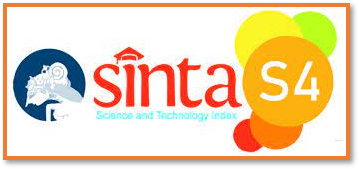Exclusive Breastfeeding and Child Sleep Quality During and After the COVID-19 Pandemic in Samarinda: A Retrospective Study
Abstract
Full Text:
PDFReferences
Sadeh A. Sleep and the developing brain. Pediatr Clin North Am. 2020;67(4):791–804.
Kaiser AP, Wagner L, Allen R. Sleep disturbances in children during COVID-19 pandemic: A systematic review. Sleep Med Rev. 2021;58:101426.
Bates LC, Zieff G, Stanford K, Moore JB, Kerr ZY, Hanson ED, et al. COVID-19 impact on behaviors across the 24-hour day in children and adolescents: Physical activity, sedentary behavior, and sleep. Children. 2021;8(2):138.
Cubero J, Valero V, Sánchez J, Rivero M, Parvez H, Rodríguez AB, et al. The circadian rhythm of tryptophan and its metabolites in breast milk affects the rhythm of infants’ sleep. Neuro Endocrinol Lett. 2013;34(6):465–70.
Thompson AL, Adair LS, Bentley ME. Maternal characteristics and perception of temperament associated with infant night waking. Matern Child Nutr. 2017;13(1):e12206.
Victora CG, Bahl R, Barros AJD, França GVA, Horton S, Krasevec J. Breastfeeding in the 21st century: Epidemiology, mechanisms, and lifelong effect. The Lancet. 2016;387(10017):475–90.
Kemenkes RI. Hasil Utama Riset Kesehatan Dasar (Riskesdas) 2018. 2018;
American Academy of Sleep Medicine. Consensus statement: Recommended amount of sleep for pediatric populations. Journal of Clinical Sleep Medicine. 2018;14(4):735–7.
WHO. Mental health and psychosocial considerations for children during the COVID-19 outbreak [Internet]. 2021. Available from: https://www.who.int/docs/default-source/coronaviruse/mental-health-considerations.pdf
Owens JA, Spirito A, McGuinn M. The Children’s Sleep Habits Questionnaire (CSHQ): Psychometric properties of a survey instrument for school-aged children. Sleep. 2000;23(8):1043–51.
Sleep Health Foundation. Children’s Sleep and Health Guidelines [Internet]. 2024. Available from: https://www.sleephealthfoundation.org.au/children-and-sleep.html
Purnamasari D. Faktor-faktor yang memengaruhi keberhasilan pemberian ASI eksklusif di Kota Yogyakarta. Jurnal Kesehatan Bhakti Husada: Health Sciences Journal [Internet]. 2022;4(1):21–9. Available from: https://jurnal.stikesbch.ac.id/index.php/jurnal/article/view/62
Endriyeni DR, Werdani KE. Hubungan usia ibu dengan pemberian ASI eksklusif di wilayah kerja Puskesmas Lubuk Buaya Kota Padang. Jurnal Ilmu Kesehatan Masyarakat [Internet]. 2021;12(1):45–51. Available from: https://journal.univetbantara.ac.id/index.php/jikemb/article/view/811
Scoot JA, Binns CW, Oddy WH, Graham KI. Predictors of breastfeeding duration: Evidence from a cohort study. Pediatrics. 2006;117(4):e646–55.
Mindell JA, Li AM, Sadeh A, Kwon R, Goh DY. Bedtime Routines for Young Children: A Dose-Dependent Association With Sleep Outcomes. Sleep. 2017;40(4):zsx005.
Doan T, Gay CL, Kennedy HP, Newman J, Lee KA. Nighttime Breastfeeding and Mother–Infant Sleep. Journal of Perinatal & Neonatal Nursing. 2019;33(3):227–36.
Yuen SL, Tran J, Scher A. Breastfeeding and infant sleep: A systematic review. Sleep Med Rev. 2021;55:101379.
Lau C, Hurst NM, Smith EO. Feeding behaviors and sleep patterns in infants during the transition to solid foods. Early Hum Dev. 2022;168:105576.
Bathory E, Tomopoulos S. Sleep and Development in Early Childhood. Curr Opin Psychol. 2017;15:146–52.
Tham EKH, Schneider N, Broekman BFP. Infant sleep and its relation with cognition and growth: A narrative review. Nat Sci Sleep. 2017;9:135–49.
Owens JA, Mindell JA. Pediatric Insomnia. Pediatr Clin North Am. 2020;67(5):915–27.
Montgomery-Downs HE, Clawges HM, Santy EE. Infant feeding methods and maternal sleep and daytime functioning. Pediatrics. 2010;126(6):e1562–8.
Liu Z, Tang H, Jin Q, Wang G, Yang Z, Chen H. Sleep of preschoolers during the coronavirus disease 2019 (COVID-19) outbreak. J Sleep Res. 2021;30(1):e13142.
Gregory AM, Sadeh A, Mindell JA. Pediatric Sleep: Assessment and Management of Sleep Problems in Children and Adolescents. Sleep Med Rev. 2018;41:1–13.
Markovic A, Godbout R, Sletten TL. Long-term effects of COVID-19 lockdowns on children’s sleep habits: A longitudinal cohort study. Sleep Health. 2022;8(1):35–42.
Kaiser S V, Kornfeld S, Tieder JS. Impact of the COVID-19 Pandemic on Pediatric Sleep: A Review of Current Literature and Implications. Pediatr Pulmonol. 2021;56(9):2630–7.
Zhou X, Snape M, Pack AI. The impact of childhood sleep disruption on cognitive and emotional development: A meta-analysis. Sleep Med Rev. 2022;59:101530.
DOI: http://dx.doi.org/10.30872/j.kes.pasmi.kal.v8i1.19903
Refbacks
- There are currently no refbacks.
Indexing by :










